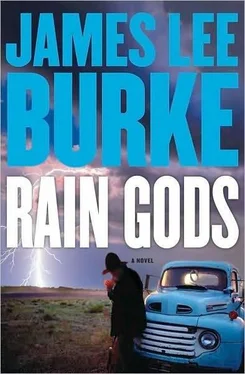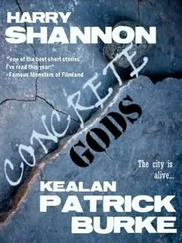
James Lee Burke
Rain Gods
In memory of James Brown Benbow,
Dan Benbow, and Weldon Mallette
And he called to him his twelve disciples and gave them authority over unclean spirits, to cast them out, and to heal every disease and every infirmity…
These twelve Jesus sent out, charging them, “Go nowhere among the Gentiles, and enter no town of the Samaritans, but go rather to the lost sheep of the house of Israel. And preach as you go, saying, ‘The kingdom of heaven is at hand.’”
MATTHEW 10:1-7
ON THE BURNT-OUT end of a July day in Southwest Texas, in a crossroads community whose only economic importance had depended on its relationship to a roach paste factory the EPA had shut down twenty years before, a young man driving a car without window glass stopped by an abandoned blue-and-white stucco filling station that had once sold Pure gas during the Depression and was now home to bats and clusters of tumbleweed. Next to the filling station was a mechanic’s shed whose desiccated boards lay collapsed upon a rusted pickup truck with four flat bald tires. At the intersection a stoplight hung from a horizontal cable strung between two power poles, its plastic covers shot out by.22 rifles.
The young man entered a phone booth and wiped his face slick with the flat of his hand. His denim shirt was stiff with salt and open on his chest, his hair mowed into the scalp, GI-style. He pulled an unlabeled pint bottle from the front of his jeans and unscrewed the cap. Down the right side of his face was a swollen pink scar that was as bright and shiny as plastic and looked pasted onto the skin rather than part of it. The mescal in the bottle was yellow and thick with threadworms that seemed to light against the sunset when he tipped the neck to his mouth. Inside the booth, he could feel his heart quickening and lines of sweat running down from his armpits into the waistband of his undershorts. His index finger trembled as he punched in the numbers on the phone’s console.
“What’s your emergency?” a woman dispatcher asked.
The rolling countryside was the color of a browned biscuit, stretching away endlessly, the monotony of rocks and creosote brush and grit and mesquite trees interrupted only by an occasional windmill rattling in the breeze.
“Last night there was some shooting here. A lot of it,” he said. “I heard it in the dark and saw the flashes.”
“Shooting where?”
“By that old church. I think that’s what happened. I was drinking. I saw it from down the road. It scared the doo-doo out of me.”
There was a pause. “Are you drinking now, sir?”
“Not really. I mean, not much. Just a few hits of Mexican worm juice.”
“Tell us where you are, and we’ll send out a cruiser. Will you wait there for a cruiser to come out?”
“This doesn’t have anything to do with me. A lot of wets go through here. There’s oceans of trash down by the border. Dirty diapers and moldy clothes and rotted food and tennis shoes without strings in them. Why would they take the strings out of their tennis shoes?”
“Is this about illegals?”
“I said I heard somebody busting caps. That’s all I’m reporting. Maybe I heard a tailgate drop. I’m sure I did. It clanked in the dark.”
“Sir, where are you calling from?”
“The same place I heard all that shooting.”
“Give me your name, please.”
“What name they got for a guy so dumb he thinks doing the right thing is the right thing? Answer me that, please, ma’am.”
He tried to slam down the receiver on the hook but missed. The phone receiver swung back and forth from the phone box as the young man with the welted pink scar on his face drove away, road dust sucking back through the glassless windows of his car.
TWENTY-FOUR HOURS LATER, at sunset, the sky turned to turquoise; then the strips of black cloud along the horizon were backlit by a red brilliance that was like the glow of a forge, as though the cooling of the day were about to be set into abeyance so the sun’s heat could prevail through the night into the following dawn. Across the street from the abandoned filling station, a tall man in his seventies, wearing western-cut khakis and hand-tooled boots and an old-fashioned gun belt and a dove-colored Stetson, parked his truck in front of what appeared to be the shell of a Spanish mission. The roof had caved onto the floor, and the doors had been twisted off the hinges and carried inside and broken up and used for firewood by homeless people or teenage vandals. The only tree in the crossroads community was a giant willow; it shaded one side of the church and created a strange effect of shadow and red light on the stucco walls, as though a grass fire were approaching the structure and about to consume it.
In reality, the church had been built not by Spaniards or Mexicans but by an industrialist who had become the most hated man in America after his company security forces and members of the Colorado militia massacred eleven children and two women during a miners’ strike in 1914. Later, the industrialist reinvented himself as a philanthropist and humanitarian and rehabilitated his family name by building churches around the country. But the miners did not get their union, and this particular church became a scorched cipher that few associate with the two women and eleven children who had tried to hide in a root cellar while the canvas tent above them rained ash and flame upon their heads.
The tall man was wearing a holstered blue-black white-handled revolver. Unconsciously, he removed his hat when he entered the church, waiting for his eyes to adjust to the deep shadows inside the walls. The oak flooring had been ripped up and hauled away by a contractor, and the dirt underneath was green and cool with lack of sunlight, packed down hard, humped in places, smelling of dampness and the feces of field mice. Scattered about the church’s interior, glinting like gold teeth, were dozens of brass shell casings.
The tall man squatted down, his gunbelt creaking, his knees popping. He picked up a casing on the end of a ballpoint pen. It, like all the others, was.45-caliber. He cleared his throat softly and spat to one side, unable to avoid the odor that the wind had just kicked up outside. He rose to his feet and walked out the back door and gazed at a field that had been raked by a bulldozer’s blade, the cinnamon-colored dirt scrolled and stenciled by the dozer’s steel treads.
The tall man returned to his pickup truck and removed a leaf rake and a long-handled shovel from the bed. He walked into the field and sank the steel tip of the shovel blade with the weight of his leg and haunch and struck a rock, then reset the blade in a different spot and tried again. This time the blade went deep, all the way up to his boot sole, as though it were cutting through compacted coffee grounds rather than dirt. When he pulled the shovel free, an odor rose into his nostrils that made his throat close against the bilious surge in his stomach. He soaked a bandana from a canteen in his truck and wrapped it around the lower half of his face and knotted it behind his head. Then he walked slowly across the field, jabbing the inverted half of the rake handle into the ground. Every three or four feet, at the same depth, he felt a soft form of resistance, like a sack of feed whose burlap has rotted and split, the dry dirt rilling back into the hole each time he pulled the wood shaft from the surface. The breeze had died completely. The air was green with the sun’s last light, the sky dissected by birds, the air stained by a growing stench that seemed to rise from his boots into his clothes. The tall man inverted the rake, careful not to touch the tip that he had pushed below the soil, and began scraping at a depression that a feral animal had already crosshatched with claw marks.
Читать дальше













